5 Signs That You Are Looking at a Fake Online Casino
In the world of online gambling, not everything is as it seems. In 2025, the digital casino market has reached unprecedented popularity—especially in countries like Greece, where platforms such as greatwincasino.gr dominate the legal and regulated scene. But with opportunity comes risk, and unfortunately, fake and fraudulent online casinos are more sophisticated than ever before.
To help players navigate this digital minefield, we’ve compiled five expert-level signs that reveal whether you’re dealing with a fake online casino. These aren’t your usual tips—they’re informed by cybersecurity insights, psychological triggers, and insider casino knowledge.
1. Lack of Proper Licensing and Transparent Regulation
This is the first red flag—and often the most obvious.
What to Look For:
- No mention of licensing authority (e.g., HGC in Greece, MGA, Curacao, UKGC)
- Fake license numbers that don’t match official databases
- No links to verify the license status directly from the regulator
Pro Tip:
Check the bottom footer of any online casino. If the licensing info isn’t clickable or takes you to a broken page, run.
Expert Insight:
Some scam sites copy license logos and images but don’t actually hold a valid license. Use regulators’ official websites to cross-check the URL and registration number.
2. Too-Good-To-Be-True Bonuses or Hidden Wagering Rules
Fake casinos often lure users in with outrageous bonuses—1000% welcome packages, no-deposit rewards for hundreds of euros, or unlimited spins.
Why This Is Dangerous:
These bonuses are usually tied to absurd conditions:
- 80x wagering requirements
- Non-withdrawable “winnings”
- Mandatory identity verification after a win (and denial of payout)
What You Should Do:
- Read the bonus terms in full
- Watch for red-flag phrases like “discretionary withdrawals” or “payout delay policy”
- Stick to platforms with transparent, fair bonus terms
Expert Insight:
Bonuses are psychological triggers. Scam casinos use them to create urgency and build trust before you notice the red flags.
3. Poor Website Security and Fake Payment Systems
If an online casino doesn’t protect your data, it’s a threat.
Spot These Technical Red Flags:
- No HTTPS encryption (look for the padlock in your browser’s address bar)
- No listed data protection policy
- Payment pages redirect to suspicious third-party sites
Advanced Signs:
- No 2FA (Two-Factor Authentication) options
- Inconsistent site design—especially on the login or cashier pages
- Only offering obscure crypto wallets with no mainstream alternatives
Expert Insight:
Many fake casinos are phishing traps. Their goal isn’t to give you entertainment—it’s to steal your identity or card info.
4. Rigged or Unverifiable Games
Licensed casinos use third-party, certified RNG (Random Number Generator) software to ensure fairness. Fake ones? They don’t.
Warning Signs:
- No mention of game providers (e.g., NetEnt, Play’n GO, Pragmatic Play)
- Games load slowly or glitch on results
- Wins seem impossible—or suspiciously frequent until you make a deposit
How to Check:
- Look for a certification logo (like eCOGRA or iTech Labs)
- Verify that the slot or game is listed on the actual developer’s website
- Use known platforms to compare legitimate game performance
Expert Insight:
Some scam sites use mock versions of popular games. They look real but are modified to reduce win rates or block payouts.
5. No Real Customer Support or Impossible Contact
Customer service is the backbone of any legitimate casino. Fake ones avoid real-time interaction like the plague.
Signs of a Support Scam:
- No live chat available
- Support email bounces or goes unanswered for days
- No phone number or physical company address
The Deep Fake Era:
Some scam casinos now use AI-generated support avatars or bots with fake names and stock photos to give a human-like feel.
How to Test It:
- Ask a technical question (e.g., “What RNG protocol does your blackjack game use?”) and see if the support can answer it
- Look for inconsistent responses, poor English, or evasive answers
Expert Insight:
Real casinos invest in trained, multilingual support. If it feels too robotic—or too quiet—walk away.
Bonus Red Flags That Deserve Your Attention
Even if a site passes the five main checks, these extras may indicate something’s off:
- Unclear withdrawal limits or reverse withdrawal options
- No presence on player review platforms or casino forums
- Overly aggressive marketing emails or SMS messages
- Redirects through multiple URLs before landing on homepage
- Games that mimic popular slots but don’t match the visuals 1:1
How Trusted Casinos Protect You
It’s not all doom and gloom—reputable platforms take steps to protect you:
- Full licensing from trusted authorities
- Independent game audits
- Transparent bonus terms
- Instant support with real agents
- Player tools: session limits, self-exclusion, and time tracking
If a casino behaves—professional, secure, transparent—you’re in safe hands.

Leave a Reply